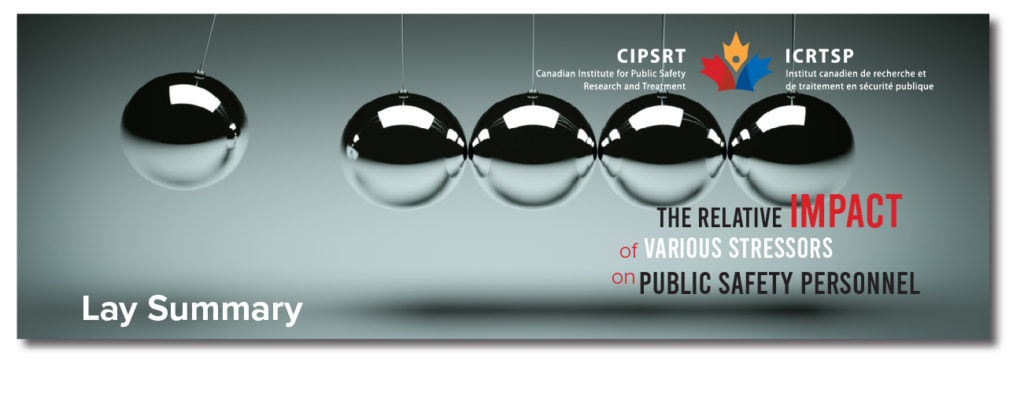Research Summaries

Why was the study done?
Public Safety Personnel (PSP) regularly come in contact with potentially psychologically traumatic events (PPTE). Further, PSP experience occupational stressors that include organizational challenges (e.g., staff shortages, inconsistent leadership styles) and operational challenges (e.g, shift work, public scrutiny). The current study was done to better understand the occupational stressors experienced by PSP as well as assess for relationships with potentially psychologically traumatic events, mental health challenges, and mental disorders.
What was done in the study?
A final sample of 4,820 participants (32% female) completed online questionnaires about: their employment sector; occupational stressors (e.g., dealing with coworkers, staff shortages, inconsistent leadership); the number of PPTE they have experienced directly or indirectly on the job (i.e., 16 different types of PPTE were assessed); and a wide range of symptoms of mental health challenges and mental disorders (e.g., Posttraumatic Stress Disorder, Major Depressive Disorder, Generalized Anxiety Disorder, Social Anxiety Disorder, Panic Disorder, and Alcohol Use Disorder, among others).
What did we find out?
- PSP report significant exposure to occupational stressors in the workplace, such as inconsistent leadership styles, staff shortages, a workplace culture perceived as unsupportive, shift work, and public scrutiny.
- Perceived occupational stress was strongly associated with evidence of mental health disorders, even after accounting for PPTE exposures.
- PSP are unavoidably exposed to a range of PPTE (on average our participants reported experiencing 11 of 16 types of trauma that were assessed), and the self-reported exposures appear associated with mental health disorders.
- In most cases, the associations between occupational stressors were more associated with some mental disorders than with PPTEs.
Where do we go from here?
The relationships between PSP perceptions of occupational stressors and their mental health challenges do not necessarily mean one causes the other. The relationship may be more complex than can be identified with the current cross-sectional data; nevertheless, the current study suggests further investigations are needed to understand the role of occupational stressors in PSP mental health. Longitudinal research may help to clarify specific questions about causation. Research into reducing occupational stressors may identify ways to help manage, and perhaps even prevent, some mental health challenges. Future studies may involve clinical interviews or behavioural information to gather more complete and in-depth information about different stressors and their impact on PSP mental health. In the interim, efforts should focus on examining leadership training and support, increased organizational engagement, increased staffing, reduced stigma, improved sleep, and strengthening social support.
Contact Us
For more information about this research, please contact CIPSRT@cipsrt-icrtsp.ca.
Original Article: Carleton, R.N., Afifi, T.O., Turner, S., Mason, J.E., Ricciardelli, R., McCreary, D.R., Vaughan, A., Anderson, G. S., Krakauer, R., Donnelly, E.A., Camp, R.D. II, Groll, D., Cramm, H.A., MacPhee, R.S., & Griffiths, C.T. (2020). Assessing the relative impact of diverse stressors among public safety personnel. International Journal of Environmental Research & Public Health 17 (4), 1234. https://doi.org/10.3390/ijerph17041234
Summary prepared by: Martin, R. Reviewed and edited by Carleton, R. N., 2020.